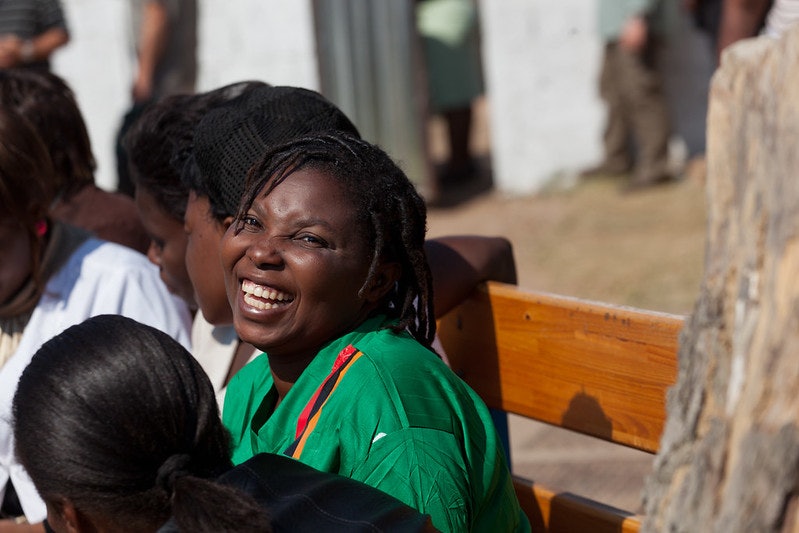Tom Hart, President of the ONE Campaign, discusses PEPFAR's 20 years of impact.
U2 lead singer Bono has called the U.S. President’s Emergency Plan for AIDS Relief (PEPFAR) a “genius plan” because the program has saved 25 million lives over the two decades since its inception by President George W. Bush.
“It’s almost hard to imagine how devastating HIV was, particularly in the continent of Africa, 20 years ago,” Tom Hart, the President of the ONE Campaign, the advocacy organization Bono co-founded to end extreme poverty and preventable disease, said in an interview. “Five thousand people were dying every day. At its peak, 2 million people died in a year…. It was destroying, gutting whole communities and countries. The CIA did one of its national intelligence reports citing HIV as having a destabilizing impact in these countries.”
Today, the picture is much different. In addition to the lives saved, PEPFAR has prevented millions of HIV infections and accelerated progress toward controlling HIV/AIDS in more than 50 countries. PEPFAR has become the largest commitment by any nation to address a single disease in human history. It has also worked through the public-private partnership Go Further to perform 5.7 million cervical cancer screenings for women living with HIV in sub-Saharan Africa.
Hart sees PEPFAR’s success as a tribute to President Bush’s leadership and clarity of mission as well as to the willingness of courageous politicians, scientists, and faith leaders to compromise, have hard conversations, and transcend partisan politics to come together to save millions of human lives.
Initially, the plans were “met with a lot of skepticism,” Hart said.
HIV medications were expensive, to the tune of $10,000 a year per patient, and required significant drug management, including timing medications and the need to take some with food. One policymaker objected that the high-tech drugs wouldn’t be effective in Africa because many people didn’t have wristwatches. Condom distribution to prevent HIV transmission, the primary U.S. policy to that point, was also controversial in some religious circles.
“There was a lot of blood on the floor during the debates around authorizing and funding this program,” Hart said. “It was a pitched battle, and the whole thing was close to falling apart, except politicians of good will said, for a bigger cause – the prevention of mass death from a preventable, treatable disease – we’re going to compromise.”
There was bipartisan support from the outset, led in the Senate by Democrat John Kerry and Republican Bill Frist and in the House by Democrat Barbara Lee and Republican Jim Kolbe. There was also outside advocacy from across the political spectrum, including evangelical churches and domestic HIV activists.
“There was a growing clamor to address this real need,” Hart said. “And there’s no substitute for the leadership and the risk that President Bush took by tackling this issue. And not just tackling it, choosing to do the most aggressive version.”
One of the things that set PEPFAR apart from preceding development programs was its emphasis on metrics and goals. At the outset, that was to put 2 million people on treatment, prevent 7 million infections, and reach 10 million people whose lives had been impacted by the disease, such as orphans, within the first five years. The president would regularly ask where the program was in meeting these targets and achieving “precision, clarity, and accountability.”
Fast forward, and the building blocks laid by PEPFAR and its sister organization, the Global Fund to Fight AIDS, Tuberculosis, and Malaria, allowed partner countries to smoothly pivot to tackle new global health challenges, including Ebola and the COVID-19 pandemic, Hart said.
PEPFAR is up for reauthorization this year and still has a lot of bipartisan support, but Hart said the ONE Campaign is working to educate new lawmakers on both sides of the aisle about the program and “its incredible lifesaving power.” He’s “confident,” however, that it will be reauthorized for another five years, despite rancor in Washington.
Because the job isn’t yet done when it comes to HIV/AIDS. More than 600,000 people still die each year from the disease.
As the program enters its third decade, many of the African government partners are stepping up to take increased leadership roles, including with financing, Hart said.
To “ensure healthy lives and promote well-being for all at all ages” is one of the United Nations’ 17 sustainable development goals for the world to achieve by 2030, and PEPFAR is one of the best ways to help that happen, he said.
“There is no program on the planet doing more than PEPFAR toward that goal,” Hart said.






























